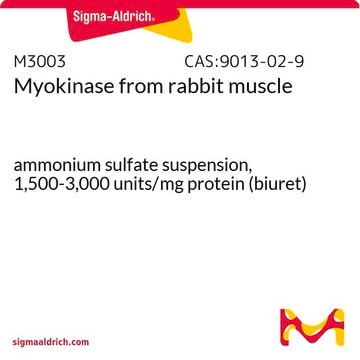10108987001
Roche
Pyrophosphatase, inorganic (PPase)
from yeast
Synonym(s):
inorganic pyrophosphatase
Sign Into View Organizational & Contract Pricing
All Photos(1)
About This Item
Recommended Products
biological source
yeast
Quality Level
form
suspension
specific activity
~200 units/mg protein (At 25 °C with inorganic pyrophosphate as the substrate.)
packaging
pkg of 1 mL (1 mg)
manufacturer/tradename
Roche
storage temp.
2-8°C
General description
Pyrophosphate phosphohydrolase
The enzyme pyrophosphatase is ubiquitously distributed in a number of organisms.
Specificity
Specific activity: Approximately 200 U/mg at +25°C with inorganic pyrophosphate as the substrate.
Application
Inorganic pyrophosphatase has been used in enzyme assays and enzyme inhibition studies.
Pyrophosphatase, inorganic (PPase) has been used in :
- Enzymatic nitric oxide (NO) detection system
- In vitro transcription
- Multiply-primed rolling circle amplification
Biochem/physiol Actions
Inorganic pyrophosphatase catalyzes the hydrolysis of inorganic pyrophosphate to orthophosphate.
Mg ions are necessary for catalytic activity of crystalline pyrophosphatase.
Quality
Contaminants: <0.01% ATPase and phosphatases, each (at pH 7 and 4-nitrophenyl phosphate as the substrate).
Physical form
Suspension in 3.2 M ammonium sulfate solution, pH approximately 6
Other Notes
For life science research only. Not for use in diagnostic procedures.
Storage Class Code
12 - Non Combustible Liquids
WGK
WGK 1
Flash Point(F)
No data available
Flash Point(C)
No data available
Certificates of Analysis (COA)
Search for Certificates of Analysis (COA) by entering the products Lot/Batch Number. Lot and Batch Numbers can be found on a product’s label following the words ‘Lot’ or ‘Batch’.
Already Own This Product?
Find documentation for the products that you have recently purchased in the Document Library.
Customers Also Viewed
Michael A Kron et al.
Protein science : a publication of the Protein Society, 17(6), 983-989 (2008-04-16)
Diagnosis of eukaryotic parasitic infection using antibody-based tests such as ELISAs (enzyme-linked immunosorbent assays) is often problematic because of the need to differentiate between homologous host and pathogen proteins and to ensure that antibodies raised against a peptide will also
Single prokaryotic cell isolation and total transcript amplification protocol for transcriptomic analysis.
Kang Y, et al.
Nature Protocols, 10(7), 974-974 (2015)
Tracking the m7G-cap during translation initiation by crosslinking methods.
Gross L, et al.
Methods, 137, 3-10 (2018)
2'-O-methylation of the mRNA cap protects RNAs from decapping and degradation by DXO.
Picard-Jean F, et al.
PLoS ONE, 13(3), e0193804-e0193804 (2018)
Assimilatory sulfate reduction in the marine methanogen Methanothermococcus thermolithotrophicus.
Jespersen, et al.
Nature microbiology, 8, 1227-1239 (2023)
Our team of scientists has experience in all areas of research including Life Science, Material Science, Chemical Synthesis, Chromatography, Analytical and many others.
Contact Technical Service










